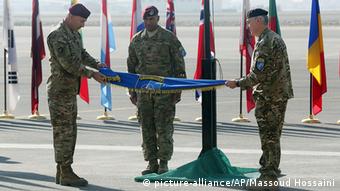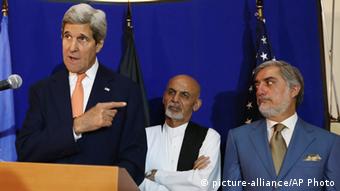As Afghan President Ashraf Ghani prepares for his first official US visit, a host of key issues will be on the agenda, including the US troop exit, prospective Taliban peace talks, and the Afghan economy. DW examines.
US President Barack Obama will host Ghani and his Chief Executive Officer, Abdullah Abdullah, when they visit the United States from March 22-25, as Washington considers whether to cut the number of US troops in Afghanistan to 5,500 by the year's end.
According to the White House, the two presidents will discuss a range of issues including security, economic development, and US support to the Afghan-led reconciliation process in what is set to be Ghani's first visit to the country following the disputed 2014 presidential poll. While in Washington, the Afghan president and his delegation will also engage in a "high-level strategic dialogue" hosted by Secretary Kerry at Camp David.
But experts agree that the scheduled US troop drawdown will be the most important issue on the agenda, as Ghani - who is seen as a leader willing to work with Washington, unlike his predecessor Hamid Karzai - has repeatedly urged the US might "re-examine" its timetable for removing the remaining 10,000 US military personnel by the end of 2016.
Improved ties
Ghani's US trip comes at a time when US-Afghan relations are on an upward trajectory, after the relationship reached a low point under Karzai. "Ghani has been saying and doing things that are music to Washington's ears: He signed the bilateral security agreement that Karzai refused to sign; he removed the ban on night raids that Karzai had put in place; and he has been pushing hard for a deeper US role that Karzai very much wanted to eschew," said Michael Kugelman, a South Asia expert at the Washington-based Woodrow Wilson Center for Scholars.
"In fact, one reason why President Obama has been willing to reconsider his drawdown schedule is because of his realization that bilateral relations are doing so well, and that Ghani is a man that he can certainly do business with," he added.
Jason Campbell, an international security expert at the US-based RAND Corporation, says that one of Ghani and Abdullah's top priorities will likely be to assure the US that Afghanistan's long term stability and prosperity is in everyone's interest, and that they are capable of implementing the necessary changes that will ensure Afghanistan is making the most out of the international support it receives.
"Ghani and Abdullah understand that Washington sets the tone when it comes to much of the international backing dedicated to Afghanistan and securing long term commitments of support will be their primary goal," Campbell told DW.
A slower drawdown?
Under the current exit plan, Washington wants to gradually wind down the level of troops to a "normal" US Embassy presence by the end of 2016, when President Barack Obama leaves office.
But over the past few weeks, doubts have also been raised by Republicans in Congress and other US officials, who argue that such a strategy would jeopardize the gains made over the past 13 years, especially in the face of an increased threat by "Islamic State" (IS) and an emboldened Taliban insurgency.
This is why analysts believe the US administration will likely scrap the current plan. "We should expect President Obama to announce that he will be phasing out the remaining US troops much more slowly than originally planned," said Kugelman. In effect, most, if not all, of the troops expected to leave Afghanistan by the end of this year will likely be staying well into next year, he added.
This would potentially mean that bases in places such as Kandahar, Jalalabad, and Bagram could be kept open longer than originally planned and that the coalition could maintain more of a regional footprint as opposed to becoming exclusively Kabul-focused, according to Campbell.
However, this does not necessarily mean that troops will to stay in the country beyond 2016. "President Obama is at the point of his presidency where legacy-crafting is important, and he wants to cement his legacy as an anti-war president who removed all US troops from Afghanistan under his watch. By allowing US troops to outstay his presidency, he would effectively be undercutting his legacy," said Kugelman.
Volatile security situation
In the meantime, a series of recent UN reports have outlined the fragile security situation in Afghanistan. In February, the United Nations Assistance Mission in Afghanistan (UNAMA) revealed that nearly 3,700 Afghan civilians were killed in the conflict-stricken country last year, the highest rate of civilian casualties since the UN body started collecting data five years ago.
Moreover, UNAMA chief Nicholas Haysom said that the threat posed by IS should not be taken lightly. "Recent reports have indicated that the Islamic State of Iraq, or DAISH as it's called in the region, has established a foothold in Afghanistan. It is UNAMA's assessment that the group's presence is of concern but that IS' significance is not so much a function of its intrinsic capacities in the region, but of its potential to offer an alternative flagpole to which otherwise isolated insurgent splinter groups can rally," said Haysom.
Although some 13,000 foreign troops remain in Afghanistan, their key objective is to advise and train the still-fledgling national forces, and to provide limited counterterrorism support. But by and large, this is a non-combat force that is not in Afghanistan to fight a war. It is in the country to help the 350,000 Afghan troops - who now have full responsibility for security - to fight the war against the insurgents.
Rallying support
The volatile security situation explains why peace and reconciliation with the Taliban are a top priority for President Ghani. And it also sheds light on why Ghani's trip to Washington comes only after visits to Pakistan and China, countries which many view as being in a good position to help Kabul bring about that objective.
In fact, Ajmal Obaid Abidy, Ghani's spokesperson, told DW that the president "wanted to visit the US after achieving a consensus in the region and the Islamic world that Afghanistan's stability is crucial to security in the region. We have worked hard to achieve this goal and therefore the president will be visiting US with a clear message."
Following his election, one of President Ghani's priorities was to solidify Afghanistan's bilateral relationships with key states and jumpstart a peace process with the Taliban that was overlooked by Karzai.
"In making Pakistan his first official visit, Ghani signaled that he wanted to mend a relationship that had reached a low point under Karzai and impress upon Islamabad the importance of their cooperation in engaging the Afghan Taliban in substantive peace talks," said Campbell.
As for China, the country is another key regional ally for Kabul that can be both a significant investor in the Afghan economy and a third party interlocutor with the Taliban. At the same time, Beijing is a key partner for Islamabad and could play a productive role in obtaining and maintaining Pakistani cooperation for such talks.
"From Ghani's perspective, visiting these two countries prior to visiting the United States was an added way of impressing upon them the importance they can play in a stable and prosperous Afghanistan," said Campbell.
An elusive peace
And these efforts seem to have yielded first positive results. Beijing recently said it was ready to support Kabul in facilitating reconciliation discussions with militant Islamic groups, while Islamabad appears to have taken a new, more resolute stance against extremism, particularly following the tragic attack in Peshawar last December.

Washington wants to gradually wind down the level of troops to a "normal" US Embassy presence by the end of 2016
However, there is still a lot of contradictory information coming from Kabul and the Taliban regarding the prospective peace talks. While the Afghan government is pushing full-speed ahead for reconciliation, the insurgents remain hesitant and vague.
"Some factions of the Taliban have agreed to pursue talks, but we have no indication that the Taliban leadership - including Mullah Omar - has given its blessing. And until that happens, we can't assume that Taliban commitments to pursue peace are credible," said Kugelman.
Moreover, with the next fighting season not far off, there could be a resumption of accusations between Kabul and Islamabad that the other side is not doing enough to stem the flow of fighters.
Additionally, as Campbell pointed out, while Ghani and Abdullah have expressed their interest in engaging in talks, the degree to which there is consensus among the political elite in Kabul as to negotiating points and red lines is questionable at best. "Overall, the general tenor surrounding peace talks is as positive as it has been in a while but productive discussions will take time," said the analyst.


No comments:
Post a Comment